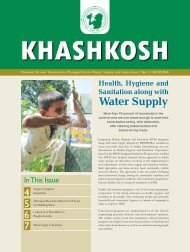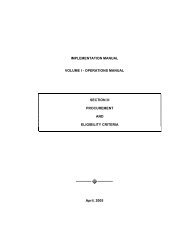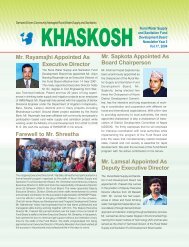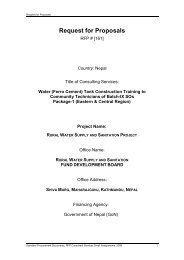ANNUAL REPORT_2008.pdf - Rural Water Supply and Sanitation ...
ANNUAL REPORT_2008.pdf - Rural Water Supply and Sanitation ...
ANNUAL REPORT_2008.pdf - Rural Water Supply and Sanitation ...
You also want an ePaper? Increase the reach of your titles
YUMPU automatically turns print PDFs into web optimized ePapers that Google loves.
Training to Community: SOs staffs are<br />
trained first by the Board <strong>and</strong> they<br />
train community people through<br />
organizing different types of training<br />
<strong>and</strong> transfer their knowledge to<br />
community people <strong>and</strong> make them<br />
capable for shouldering all<br />
responsibilities <strong>and</strong> accountability.<br />
From the very beginning of the<br />
development phase, the communities,<br />
particularly WSUC members,<br />
treasurers, WTSS members, VHPs <strong>and</strong><br />
VMWs are educated <strong>and</strong> trained by<br />
the SO staff by organizing various<br />
trainings at field level on CAP/HHS,<br />
leadership <strong>and</strong> management, resource<br />
mobilization, conflict management,<br />
<strong>and</strong> project planning, implementation<br />
<strong>and</strong> monitoring & evaluation<br />
considering <strong>Water</strong> <strong>Supply</strong> <strong>and</strong><br />
<strong>Sanitation</strong> project along with its<br />
associated community development<br />
activities. The SOs staffs are using<br />
SARAR participatory tools including<br />
other participatory methods during<br />
these training programs.<br />
Communities prepare <strong>and</strong> implement<br />
Community Action Plans (CAPs) such<br />
as, lay out plan for water supply,<br />
health hygiene <strong>and</strong> sanitation plan,<br />
WTSS plan, environment management<br />
plan including school sanitation <strong>and</strong><br />
social conflict management plan in<br />
order to deliver sustainable water<br />
supply <strong>and</strong> sanitation facilities <strong>and</strong><br />
reduce rural poverty through<br />
empowering women by using their<br />
time saved.<br />
Table 3: Training to Community People by Batch/Year<br />
S.N.<br />
Types of Training<br />
Up to 2007 2008<br />
Batch V Batch VI Batch VII Batch VII<br />
Total<br />
1 Training to WSUC on Leadership, Book keeping,<br />
CAP <strong>and</strong> Conflict Management 3674 3438 2080 1732 10924<br />
2 Training to WSUC & Treasurers on<br />
Book keeping <strong>and</strong> Financial Management 334 990 1664 1222 4210<br />
3 Training to VHP on HHSE 342 382 427 223 1374<br />
4 Training to VMW on Operation <strong>and</strong> Maintenance 334 182 218 734<br />
5 Training to WSUC Post Construction 3674 910 0 4584<br />
6 Training to School Teacher <strong>and</strong> Student on HSE 6875 7400 1610 7129 23014<br />
Total 15233 13302 5781 10524 44840<br />
7 · RWSSFDB Annual Report 2008


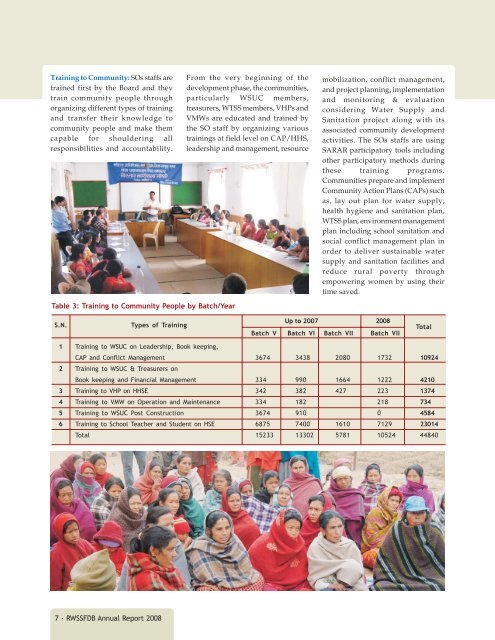
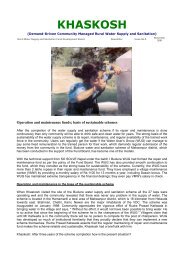
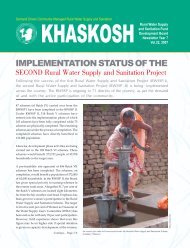
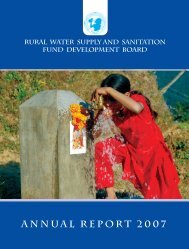
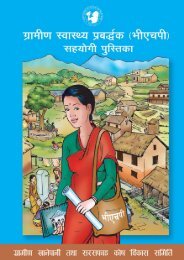

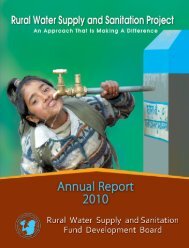
![vfg]k fgL tyf ;/;kmfOsf] If]qdf sf]if ljsf; ;ldltsf] cjwf/0ff pTs[i7 cEof](https://img.yumpu.com/38832733/1/190x245/vfgk-fgl-tyf-kmfosf-ifqdf-sfif-ljsf-ldltsf-cjwf-0ff-ptsi7-ceof.jpg?quality=85)

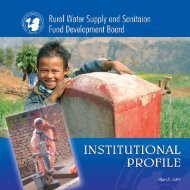
![Request for Proposals RFP # [162] - Rural Water Supply and ...](https://img.yumpu.com/38832347/1/184x260/request-for-proposals-rfp-162-rural-water-supply-and-.jpg?quality=85)
